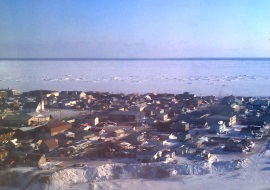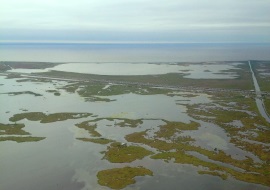Regional Ocean Planning
ELI is helping support regional ocean and coastal planning efforts around the world that are based on local priorities, transparent and inclusive processes, and best available information. We work with domestic and international entities to help develop systems that reduce conflicts among multiple ocean users and maximize the long-term sustainability of marine ecosystems.
U.S. Arctic: Climate Change & Marine Subsistence Resources
Climate change is causing rapid environmental shifts in the Arctic and there is growing interest in exploiting Arctic  resources. Alaska Native communities that subsist on marine resources are both poised to be most impacted by these changes and also have extensive knowledge of the affected ecosystems based on generations of experience. As we continue into an era of rapid change, ELI works to support the voice of Alaska Native communities and subsistence hunters in offshore management processes in the Alaskan Arctic. These efforts will help ensure that marine ecosystems continue to support the critical services, including subsistence harvest, on which Arctic communities depend.
resources. Alaska Native communities that subsist on marine resources are both poised to be most impacted by these changes and also have extensive knowledge of the affected ecosystems based on generations of experience. As we continue into an era of rapid change, ELI works to support the voice of Alaska Native communities and subsistence hunters in offshore management processes in the Alaskan Arctic. These efforts will help ensure that marine ecosystems continue to support the critical services, including subsistence harvest, on which Arctic communities depend.
Mid-Atlantic: Offshore Energy
ELI has worked with the Mid-Atlantic states to assess how their coastal and offshore laws and policies accommodate and manage offshore energy development. This has included collaborating with the states of Delaware, Maryland, and Virginia to analyze their offshore energy laws, assess how they protect the coastal environment while facilitating offshore renewable energy development, and provide practical recommendations for strengthening the existing frameworks. ELI has also worked with the five Mid-Atlantic states (New York, New Jersey, Maryland, Delaware, and Virginia) on a regional guide to offshore wind management. In April 2013, ELI collaborated with Monmouth University, Rutgers Law School, and New Jersey Sea Grant to host a symposium on Mid-Atlantic regional ocean planning, leading to the publication of a special issue of the Sea Grant Law & Policy Journal.
-
A Guide to State Management of Offshore Wind Energy in the Mid-Atlantic (2013)
-
Sea Grant Law & Policy Journal Vol. 6.1: Mid-Atlantic Regional Ocean Governance (Summer 2013)
-
Delaware Offshore Alternative Energy Framework Review and Recommendations (2011)
-
Virginia Offshore Energy Development Law and Policy Review and Recommendations (2008)
Gulf of Mexico

Wetlands in southern Louisiana
ELI has worked for years to support the conservation and restoration of ocean and coastal resources in the Gulf of Mexico. Our team has examined the existing legal and institutional frameworks to support habitat protection, both in the United States and Mexico. Following the BP Deepwater Horizon spill in April 2010, ELI began working to educate Gulf of Mexico fishermen and communities about the law, policy, and management issues surrounding restoration and recovery of the region. Four years after the spill, ELI continues to support community engagement in restoration and recovery planning and coordination between the different processes. We also maintain a BP Deepwater Horizon Oil Spill Litigation Database to help people understand the ongoing litigation landscape.
-
ELI’s portal on Gulf of Mexico restoration and recovery (continuously updated)
-
BP Deepwater Horizon Oil Spill Litigation Database (updated frequently)
Caribbean
The Caribbean coastal environment supports a wide diversity of livelihoods in the region, but is also heavily impacted by mutiple, sometimes conflicting ocean uses. Focusing on several Caribbean regions, including the Eastern Caribbean nations of Grenada and St. Vincent & the Grenadines and the island of Barbuda, ELI is working to strengthen marine enforcement and management in the region through the development of marine protected areas and marine spatial planning frameworks.
